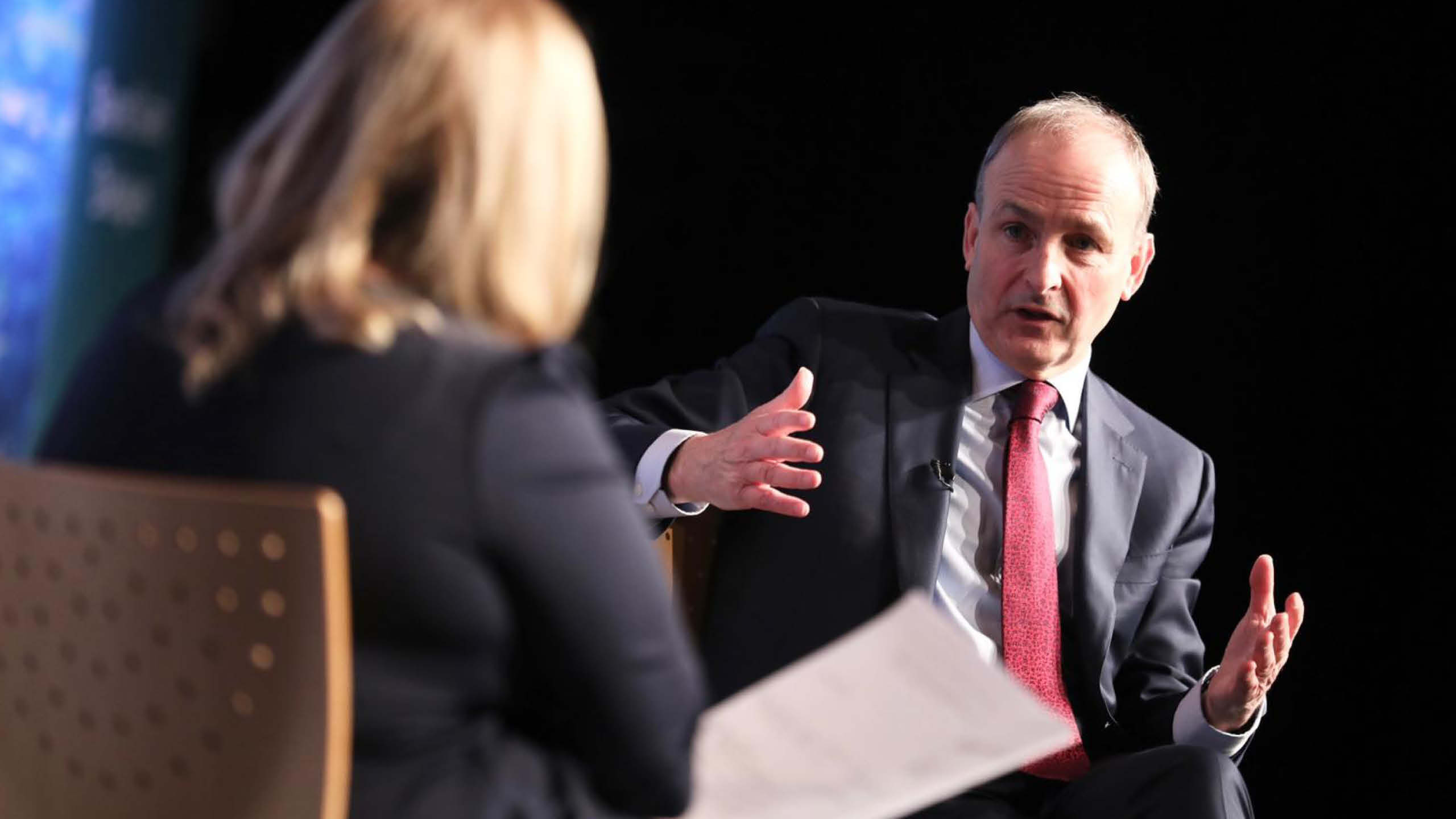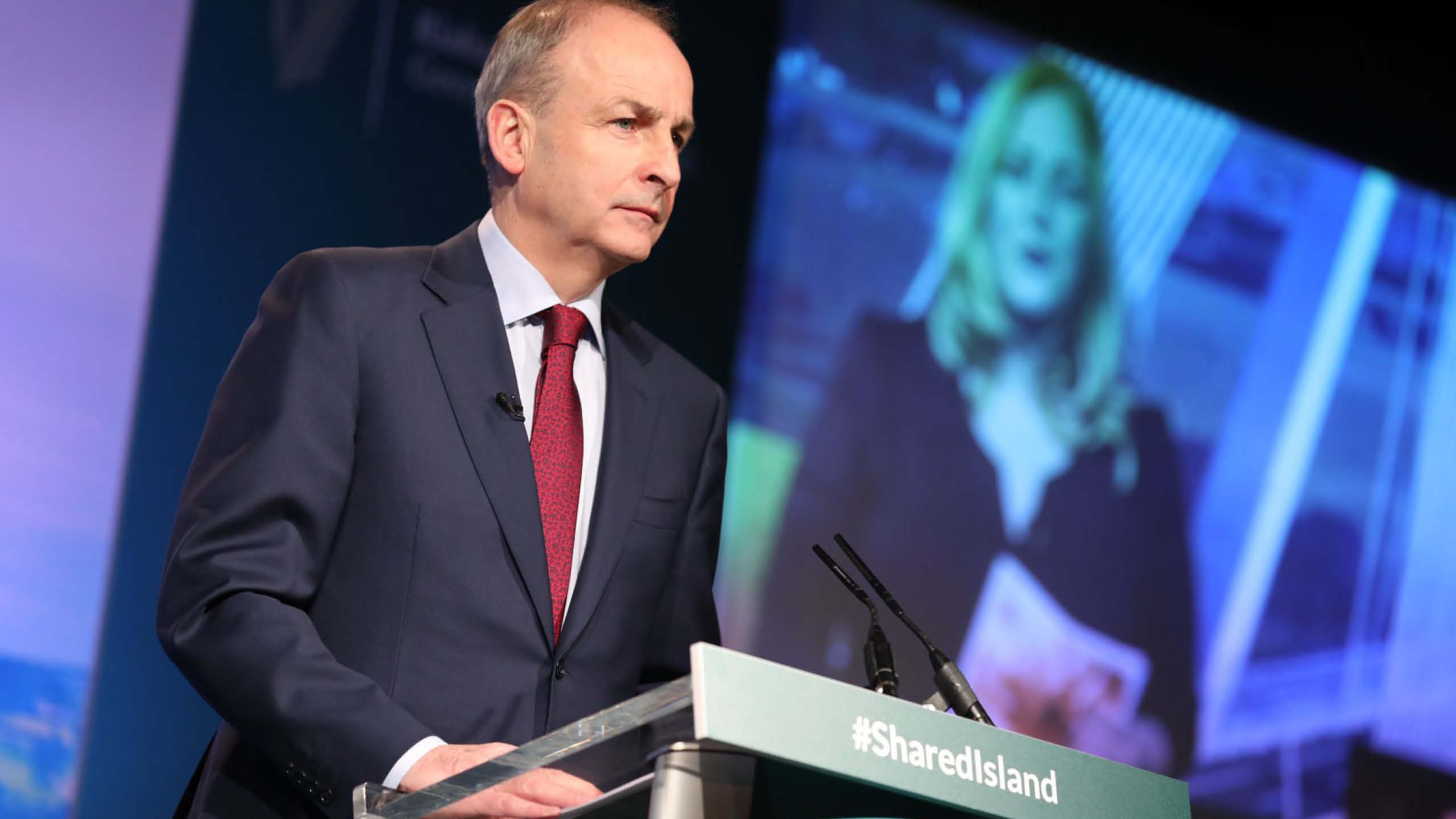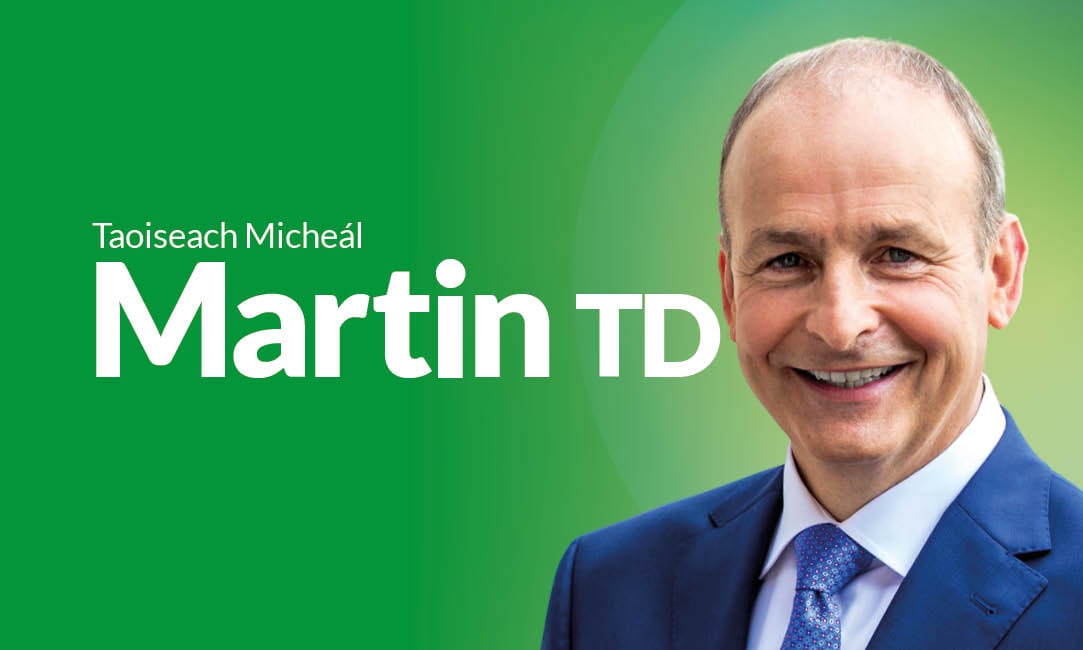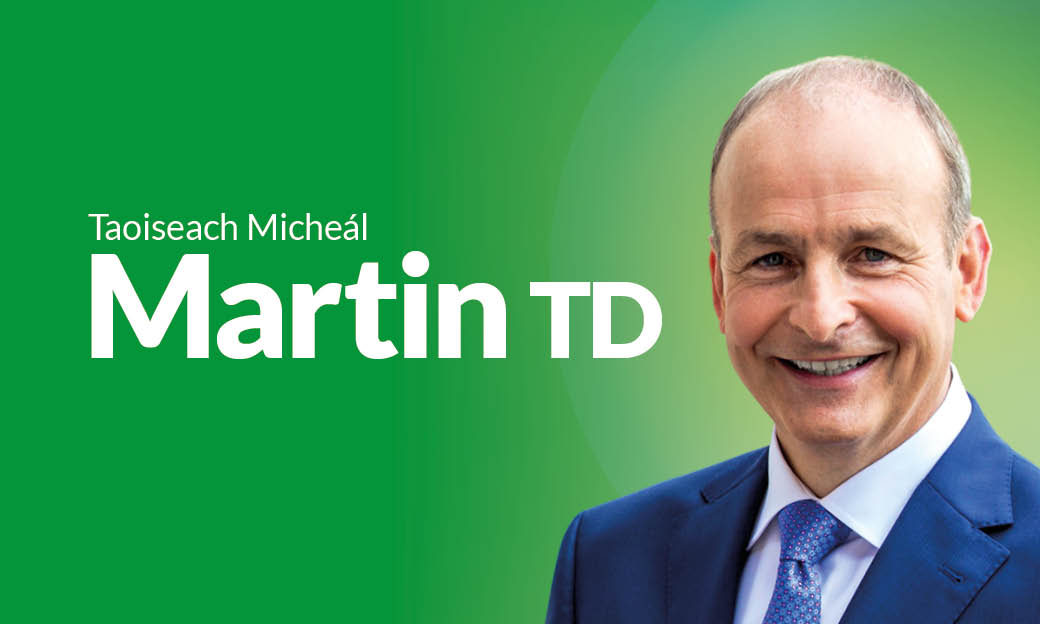Opening statement by Taoiseach Micheál Martin TD - Meeting with Joint Committee on Implementation of the Good Friday Agreement on Shared Island initiative
Published on: 29 April 2022
Thank you, Chair.
It is good to have this opportunity to meet with this Committee today to discuss the Government’s Shared Island initiative.
Cuirim fáilte roimh bhur gcuid spéise agus rannpháirtíochta, ar príomhghnéithe iad agus muid ag tabhairt an tionscnaimh ar aghaidh.
Tá áthas orm go n-iarrtar ar chomhaltaí an Choiste seo, agus ar chomhaltaí Choistí ábhartha eile an Oireachtais, a bheith rannpháirteach inár n-imeachtaí agus inár nIdirphléití éagsúla maidir le hOileán Comhroinnte.
I launched the initiative eighteen months ago, as a whole of Government priority, setting out a broad, positive, inclusive agenda.
Focused on engaging with all communities and traditions to build consensus around a shared future; and delivering tangible benefits for the whole island, underpinned by the Good Friday Agreement.
The Agreement - resoundingly endorsed by the people of this island in historic referendums almost twenty-four years ago - empowers us all to work for a better and reconciled future:
Without in any way compromising our different, equally legitimate identities, beliefs and aspirations for the future of this island - nationalist, unionist or neither.
The Government’s Shared Island approach involves:
Raising the level of ambition for what we achieve through all-island partnerships - working with the Executive, UK Government, Local Authorities and civil society;
Delivering on cross-border investment commitments and developing a new generation of projects, focused on our major shared challenges, North and South; and,
Fostering inclusive civic dialogue and a comprehensive programme of research to inform our shared island policy and to help build consensus around a shared future.
I’d like to set out to the Committee how we have taken this work forward so far and through this year.
Building a Shared Island
Through the revised National Development Plan last year, the Government set out an unprecedented commitment of €3.5 billion for all-island investment out to 2030.
Including an extended and increased commitment of at least €1 billion this decade to the Government’s Shared Island Fund, established in October 2020.
As part of the revised National Development Plan, we defined new investment priorities - across virtually all sectors - to deploy this funding.
Our goal is to work through all-island partnerships to invest for a more connected, sustainable and prosperous island for all.
The Government is working intensively to do that.
I established a Shared Island unit in my Department to drive and coordinate delivery of our priorities across all Government Departments.
In 2021, the Government allocated €50 million from the Shared Island Fund.
To start moving ahead with two long-standing cross-border projects - the Ulster Canal and Narrow Water Bridge – that have been talked about for decades.
The Government also commenced a major new North/South Research Programme.
Last month, I and Minister Simon Harris announced over €37m in the first awards by the Higher Education Authority under the programme, resourced through the Shared Island Fund.
We are funding research teams in Universities from all corners of the island to work on pioneering projects over the next four years.
For instance, on cancer and vaccine research; biodiversity conservation and; developing an Atlantic Innovation Corridor across the multi-city region of Derry, Galway and Limerick. To mention some of the 62 successful projects.
Earlier this month, I announced a new €5m Shared Island development funding scheme, open to Local Authorities across the island.
Local Authorities want to work together on a North-South basis, for instance, to create tourism trails; conserve heritage; protect biodiversity; and help meet regional skills needs.
This new funding initiative, provides the seed capital to local authorities to bring their proposals to the point where they can apply for more substantial support, in both jurisdictions.
The aim is to empower Councils to develop a pipeline of new cross-border capital projects that will deliver common regional development goals and maximise the opportunities from working together on an all-island basis.
And, through this year, Ministers across Government are working to advance new Shared Island Fund projects.
Including for:
- Electric Vehicle charging infrastructure;
- cross-border community climate action partnerships;
- border region enterprise development; and,
- all-island civil society partnerships.
I also want to see Culture, Arts and Creativity as a key pillar in the Shared Island initiative.
So, we are taking account of shared island themes and opportunities in developing the new Creative Ireland programme that will run for the next five years.
And, working to foster more cooperation between our Arts Councils and by Culture Ministers, to support a deepening of artistic and cultural exchange.
We need in the time ahead, not just to better accept cultural diversity on this island, but to celebrate it.
The Government is also working with the Executive and the UK Government to move ahead with our cross-border investment commitments under the New Decade, New Approach Agreement.
Including:
- Capital investment to support expanded access and collaboration on higher education in the North West region - working with Ulster University Magee Campus and the new Atlantic Technological University Letterkenny Campus;
And,
- Delivering new cross-border greenways, and our transport connectivity commitments, including the Government’s contribution to the A5 upgrade.
The Shared Island Fund means that we have the resourcing ready to go for all of these major projects.
The Government and Executive have also commenced the first ever all-island strategic rail review, to be completed later this year, including a focus on better connections for the North West.
Informed by the outcome of this review, we will make new strategic investments in sustainable rail, working with the Executive and the UK Government.
And we want to do significantly more with both the Executive and the UK Government:
Already, the PEACE PLUS programme - funded by the European Union, UK Government, Irish Government and Northern Ireland Executive - will provide more than €1bn over the next seven years to support peace and prosperity on this island.
We want to complement this with new, and more strategic and impactful dimensions to our North/South and East/West relationships.I have had good engagement with Prime Minister Boris Johnson and with political leaders in Northern Ireland on how we can do that, as part of our Shared Island approach.
By working and investing together on common goals - including on climate action and sustainable transport.
We are aiming to move ahead this year to establish new all-island research hubs, supported on the Government side through the Shared Island Fund and by Science Foundation Ireland.
To bring industry, research agencies and institutions together to conduct world-leading r&d, in areas of common priority for both jurisdictions.
These hubs will contribute to our collective FDI offering and indigenous enterprise base, that supports good jobs in towns and cities across this island.
The Government wants to see a deepening of beneficial cooperation and societal connections on the island, in all areas.
That is how we can - both in government and in society - take forward the core commitment of the Good Friday Agreement to “strive in every practical way towards reconciliation”.
As I know this Committee agrees, that is a fundamental interest for us all on this island.
I have asked all Ministers to bring forward new investment, policy and cooperation initiatives that will deliver on our Shared Island priorities as set out in the National Development Plan. This work is underway now, coordinated by my Department.
Research Programme
My Department has also commenced a wide-ranging Shared Island research programme, working with the National Economic and Social Council; Economic and Social Research Institute; the Irish Research Council; and other partners.
Earlier today, I participated in the launch of the fourth ESRI Shared Island research report, which is the first systematic examination of education systems and outcomes across both jurisdictions on the island, from primary through to tertiary levels.
The ESRI has also examined and published reports in recent months on the structure and collaborative potential of: the services economy; foreign direct investment; and of primary healthcare systems - all on an island-wide basis.
ESRI work underway now and to publish later this year is looking at: renewable energy supports; productivity levels; as well as migrant integration and early years’ experience and policy, North and South.
And, on 12 April, I participated in the launch event for a major report to Government by the National Economic and Social Council on Shared Island: Shared Opportunity.
This was the first NESC report with a dedicated and strategic all-island focus.
Following broad-based consultation across the island over the last year, NESC has made a series of recommendations on how we can deepen beneficial cooperation across the island, in economic, social and environmental terms. NESC found very significant support in practice for all-island approaches to key challenges.
The Government will positively consider NESC’s recommendations, coordinated by my Department, and we will seek to take them forward in consultation with the Executive and UK Government.
We want to see all of the outputs under the Shared Island research programme informing policy planning, political debate and agreed actions on how we work for a more equitable, connected and prosperous society on this island in the years immediately ahead.
Shared Island Dialogue
Broad-based, inclusive all-island civic dialogue is also central to the Government’s approach.
Over the last year and more, over 1,300 citizens and civic leaders have participated across 9 events so far in our Shared Island Dialogue series.
Inclusion is at the heart of these dialogues, involving people from across all sectors, communities, political traditions and regions.
We are ensuring the inclusion of voices that are not sufficiently heard in our peace process, particularly of women, young people and ethnic minorities.
The Dialogues are looking in practical ways at how we can better share this island: for instance, on climate action, healthcare cooperation, tourism, and sport.
And Dialogues are engaging with societal questions around identity, culture, equality and inclusion. Issues that we need to acknowledge, discuss and do better on together on this island.
The Government is hearing from those most directly involved in different sectors, how a shared island agenda can be further pursued around impactful, beneficial, achievable actions - by government and civil society.
Shared Island Dialogues will be held throughout this year. Now, on an in-person and regional basis.
The next Dialogue will be convened by Minister Heather Humphreys on ‘enabling rural and community development on a shared island’, on 20 May in Monaghan.
These discussions are affirming the goodwill and common ground there is in civil society - across different communities and political traditions - to cooperate on common challenges for this island.
And making clear too that people don’t view identity in simplistic, binary terms, as it is too often portrayed in politics, particularly in Northern Ireland.
New voices, perspectives and experiences in our communities are reframing debates and defining new priorities for how we share this island in the years ahead.
In a Dialogue I participated in with young people, equality, climate, education, economic opportunity, and mental health were among the greatest concerns. They want to see these issues far more to the fore in how we work through the Good Friday Agreement.
The Dialogues are directly informing how the Government is working to deepen our North/South and East/West partnerships through the Good Friday Agreement.
They are also proving to be a starting point for broader and deeper civic conversations on a shared future.
They help build understanding, confidence and consensus around taking forward a more ambitious shared island agenda for the years ahead, that can benefit all communities.
So, the Government will continue to support and engage with civic initiatives as an integral part of our Shared Island approach.
Finally, I want to say something about the political context for this work.
Next week, the people of Northern Ireland will vote to provide a new democratic mandate for the devolved power-sharing institutions at Stormont.
It is vital for the future of Northern Ireland and for relationships on these islands that the political parties take their mandates from the Assembly elections and move quickly to form a new Executive.
That is what the people of Northern Ireland want.
This is a moment for political leaders to live up to the commitments of the Good Friday Agreement, which is overwhelmingly supported by people across this island.
Political leadership - by all with a role and responsibility - is also fundamental, in getting beyond the issues around Brexit and the Protocol that have hindered the Peace Process over the last six years.
We need to return the focus to working collectively to support progress and prosperity for all in Northern Ireland and across this island.
And to realising the opportunities in our societal, economic, cultural and political relationships through the framework of the Good Friday Agreement.
These are the Government’s objectives and responsibilities as a co-guarantor of the Good Friday Agreement.
We are significantly prioritising, resourcing and delivering an ambitious, practical agenda to support that through our Shared Island initiative.
Thank you, Chair, and I look forward to discussing this work with the Committee Members and to ongoing engagement with the Committee on the Shared Island Initiative.



